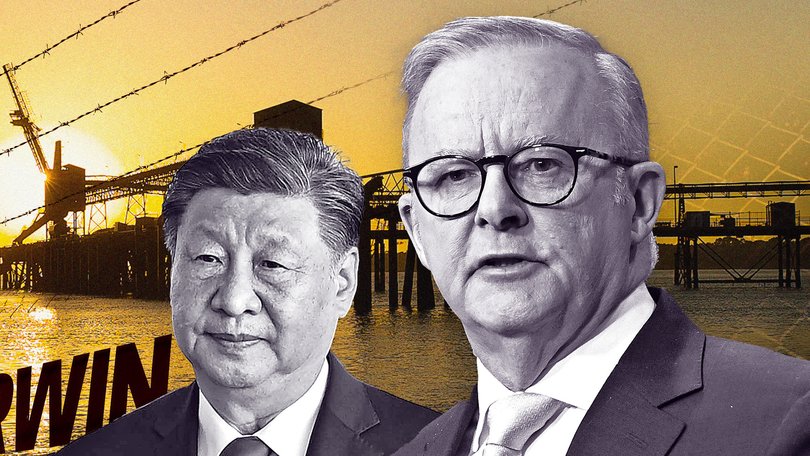Anthony Albanese not backing down on Port of Darwin handover ahead of Xi Jinping talks in Beijing

Prime Minister Anthony Albanese says he will not back down over the Government’s election promise to transfer the Port of Darwin into Australian hands when he meets Chinese President Xi Jinping in Beijing on Tuesday.
The controversy over the decision to wrest the strategic port from the Beijing-controlled company Landbridge Group looms over Mr Albanese’s upcoming face-to-face talks with Mr Xi, where he intends to talk up Australia’s growing economic and cultural ties with China.
The awarding of a 99-year lease of the port to Landbridge by the Northern Territory’s Liberal Party Government was viewed by many, including Washington, as a strategic mistake and triggered a national security stoush during the recent Federal election.
Sign up to The Nightly's newsletters.
Get the first look at the digital newspaper, curated daily stories and breaking headlines delivered to your inbox.
By continuing you agree to our Terms and Privacy Policy.The Government’s election commitment to look for potential buyers prompted a fierce backlash from Beijing at a time when Australia is seeking reset the focus of bilateral relations on economic and trade ties and seek further co-operation on green energy and tackling climate change.
Chinese State media has repeatedly raised the topic in a series of articles over the past week, in an indication of its importance to the Chinese government. But Mr Albanese insisted on Monday he would not reverse the decision if raised in his meetings with Mr Xi.
“Our position is very clear, and I’m sure that the President’s very clear and is knowledgeable of that,” he told a media conference in Shanghai.
The Prime Minister batted away suggestions raised on the country’s strictly censored social media that China could take countermeasures such as restricting Australian access to key Chinese markets or tightening imports of key resources such as iron and oil.
Asked if he had any concerns about potential blowback for industry, Mr Albanese replied with a straight, “no.”
He said the Government’s move had been executed in an “orderly” fashion, “and we will go through that process”.
“Governments cannot respond in policy terms every time there’s an article written or a tweet or a blog and change their position. Good government has a position, advocates for it and implements it,” Mr Albanese said.
He declined to reveal whether he would address other major security issues during his meeting with the President, including the circumnavigation of Australia and live fire drills by a Chinese naval fleet earlier this year. There have also been reports Chinese surveillance ships may be monitoring the multinational Talisman Sabre military drills being carried out along Australia’s coastline.
Instead, Mr Albanese underscored the link between peace and stability and the economic relationship with China.
“One of the things that’s important to recognise is that the economic relationship is obviously based upon a stable and secure region,” he said.
“We’ve seen the disruption that occurs when there is conflict in the world. That’s why we need to make sure that we do everything we can to promote peace and security in the region.”
The Prime Minister’s message was echoed by Treasurer Jim Chalmers in Canberra, who said the “best defence against more uncertainty and more volatility is more engagement and more resilience”.
He said Mr Albanese was conducting “economic diplomacy” in China as the Government focussed on navigating a world where volatility and unpredictability were “the norm, not the exception”.
“Global conditions will be the primary influence on our economy and on our choices in the government’s second term, because what we’re dealing with is extreme global economic uncertainty compounded by conflict and trade tensions around the world,” Dr Chalmers said.
Mr Albanese was joined in Shanghai by several of Australia’s top business leaders including BHP Australia president Geraldine Slattery, Rio Tinto Australia chief executive Kellie Parker, Hancock Iron Ore chief executive Gerhard Veldsman and Fortescue chairman Andrew Forrest.
The Shanghai roundtable brought together a handpicked group of Australian and Chinese industry titans, such as Xu Shishuai from the Ansteel Group and Wang Jiming, vice-president of the Baowu Group, to address the steel decarbonisation vital to combat climate change and at the centre of Australia’s drive to become a “renewable energy superpower.”
“The relationship that these business people have with their Chinese counterparts, I’ve just seen first hand, the producers with customers, producing value and jobs in both countries is very important for Australia,” Mr Albanese said.
Ms Slattery said Monday’s gathering was “a testament to the significant and enduring relationship of the economic and shared trust relationship between Australia and China.”
She said it spoke to “the continued need for productivity, for resilience in the iron ore sector in Australia” as well as “to the strength and the longevity and the future potential” of ties between Australian iron ore producers and customers here in China in decarbonisation.
Ms Parker said Rio Tinto had been exporting iron ore to China for five decades, a history which had “deepened our relationship with mutual trust and collaboration,” that would be boosted further by steel decarbonisation.
Steel decarbonisation involves reducing carbon dioxide emissions in steel production that significantly add to global emissions.
“We will create the future together of steel decarbonisation. And it takes research, it takes commitment, and it takes both countries and companies to be working together — so today’s conversation was really important,” Ms Parker said.
Australian miners are reliable and stable suppliers of iron ore, responsible for almost 60 per cent of China’s iron ore imports. That iron ore goes into Chinese steel production which accounts for over 50 per cent of global supply.
Hancock’s Mr Veldsman said making sure Australia’s iron ore industry remained cost-competitive was paramount.
“There’s major challenges facing us, but the one thing we all agree on, steel is really important for the world, and if we want to continue to lift living standards in the world, we need to continue to provide cost-effective steel,” he said.
Mr Forrest said the path to a “peaceful, long term relationship” lay in job creation and economic growth.
“I asked our Prime Minister if he could work together with China to form a bilateral agreement where we escape the threats coming from AI to employment, both in China and Australia, and generate a serious jobs boom in both China for green steel and particularly for Australia in green iron,” he said.
While China remains the world’s largest emitter, it is also viewed as a clean tech powerhouse, funnelling huge resources into renewable energy sources and decarbonising its industrial production.
The Government and industry view greater collaboration on green steel with China as vital to meeting Australia’s own green energy goals.
In his speech to the morning roundtable, Mr Albanese said it was in both countries interests to ensure a sustainable and market-driven global steel sector, calling on industry to take the lead.
Mr Forrest argued that “going hard into green steel,” would not only create hundreds of thousands of new jobs but also tackle the single biggest industrial polluter in the world.
He said chasing that tail was “incredibly important” for future generations, the employment drive and for the people of Australia and China.
Ahead of his trip, the Prime Minister was urged not to shy from addressing security and human rights concerns, including the death penalty handed down to jailed Australian writer Yang Hengjun.
“We always raise issues of Australian citizens, and if you look at my record, it’s not too bad, certainly compared with any of my predecessors,” Mr Albanese said on Monday.

